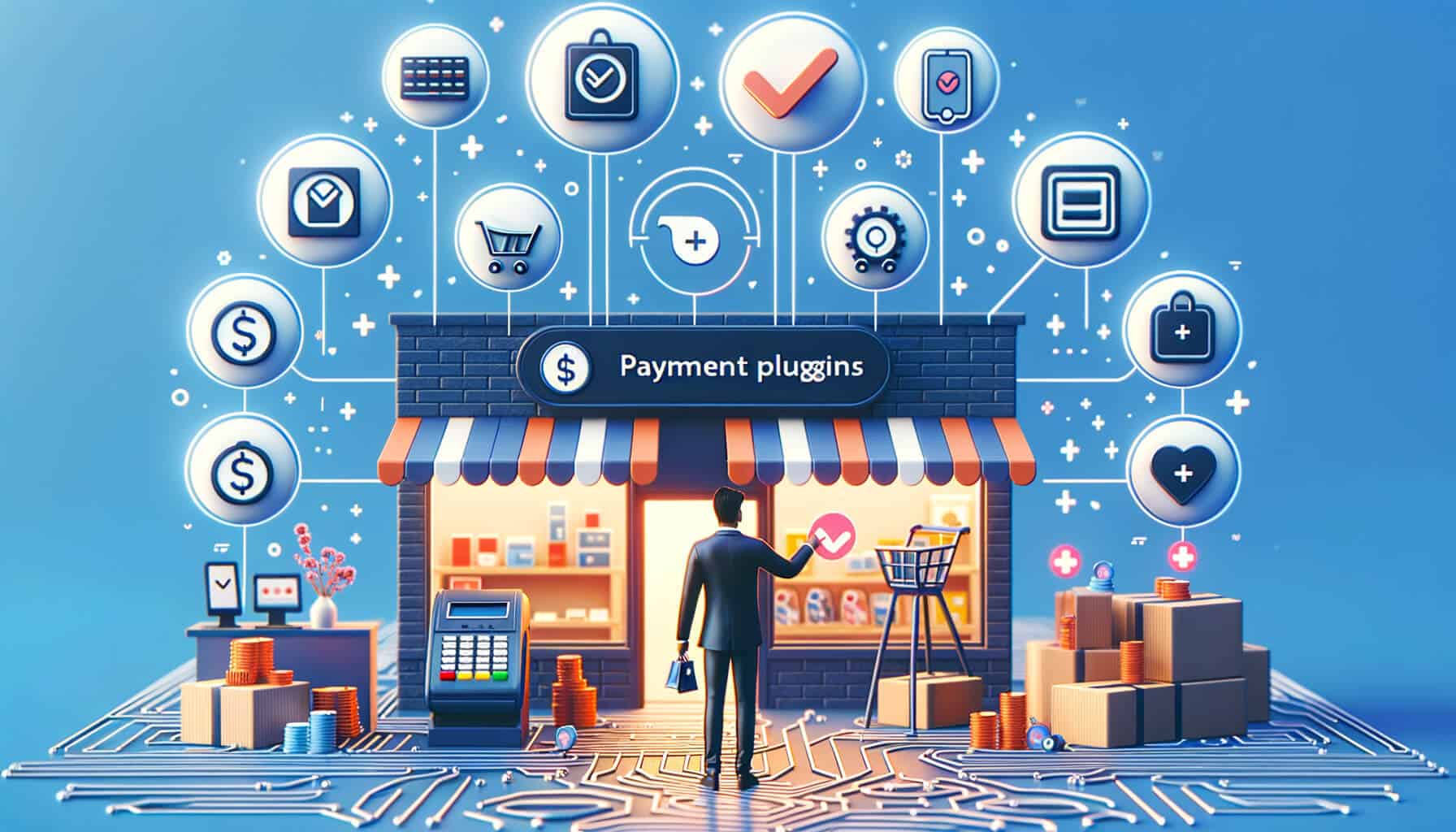
By Crystal Hopkins November 9, 2024
In today’s digital age, retailers are increasingly relying on e-commerce platforms to reach a wider customer base and boost sales. However, one crucial aspect that often gets overlooked is the payment process. A seamless and secure payment experience is essential for customer satisfaction and can significantly impact a retailer’s bottom line. This is where specialized payment plugins come into play.
Payment plugins are software extensions that integrate with e-commerce platforms to facilitate online transactions. While there are generic payment plugins available, retailers can greatly benefit from using specialized payment plugins tailored to their specific needs. These plugins offer a range of features and functionalities designed to enhance the payment process, improve security, and optimize the overall customer experience.
Understanding the Role of Payment Plugins in Retail Operations

Payment plugins play a vital role in the day-to-day operations of retail businesses. They act as a bridge between the retailer’s e-commerce platform and the payment gateway, ensuring smooth and secure transactions. By integrating with the e-commerce platform, payment plugins enable retailers to accept various payment methods, such as credit cards, digital wallets, and alternative payment options.
Furthermore, payment plugins provide retailers with real-time transaction data, allowing them to track sales, monitor inventory, and generate reports. This valuable information helps retailers make informed business decisions, identify trends, and optimize their product offerings. Additionally, payment plugins often offer features like recurring billing, subscription management, and invoicing, which are particularly useful for businesses with subscription-based models or recurring payments.
Benefits of Specialized Payment Plugins for Retailers

- Enhanced Security: One of the primary concerns for retailers is ensuring the security of customer payment information. Specialized payment plugins offer advanced security features, such as tokenization and encryption, to protect sensitive data during transmission and storage. These plugins comply with industry standards and regulations, providing peace of mind to both retailers and customers.
- Seamless Integration: Specialized payment plugins are designed to seamlessly integrate with specific e-commerce platforms, ensuring compatibility and smooth operation. This eliminates the need for complex coding or custom development, saving time and resources for retailers. Moreover, integration with popular e-commerce platforms like Shopify, WooCommerce, and Magento allows retailers to leverage the existing functionalities of these platforms.
- Customization Options: Specialized payment plugins often offer customization options that allow retailers to tailor the payment process to their brand and customer preferences. Retailers can customize the look and feel of the payment page, add their logo, and choose the payment methods they want to offer. This level of customization helps create a consistent and branded experience for customers, enhancing trust and loyalty.
- Improved Conversion Rates: A clunky or complicated payment process can lead to cart abandonment and lost sales. Specialized payment plugins are designed to optimize the checkout experience, reducing friction and increasing conversion rates. Features like one-click payments, guest checkout, and saved payment information streamline the process, making it quick and convenient for customers to complete their purchase.
- Access to Advanced Features: Specialized payment plugins often come with additional features that can benefit retailers. These may include fraud prevention tools, chargeback management, multi-currency support, and integration with popular third-party services like PayPal, Apple Pay, or Google Pay. These features enable retailers to expand their reach, cater to a global customer base, and provide a seamless payment experience across different devices and platforms.
Factors to Consider When Choosing a Payment Plugin for Retail Businesses

When selecting a payment plugin for their retail business, there are several factors that retailers should consider:
- Compatibility: Ensure that the payment plugin is compatible with your e-commerce platform. Check if it supports the necessary features and functionalities required for your business.
- Security: Look for payment plugins that offer robust security measures, such as encryption, tokenization, and compliance with industry standards like PCI DSS. Consider the reputation and track record of the payment plugin provider in terms of security.
- Payment Methods: Evaluate the payment methods supported by the plugin. Consider the preferences of your target audience and ensure that the plugin supports popular payment options to cater to a wide range of customers.
- Pricing: Compare the pricing models of different payment plugins. Some plugins charge a flat fee per transaction, while others have a monthly subscription or tiered pricing structure. Consider the transaction volume and average order value of your business to determine the most cost-effective option.
- Customer Support: Look for payment plugins that offer reliable customer support. Consider the availability of support channels, response times, and the expertise of the support team. Prompt and knowledgeable support can be crucial in resolving any issues that may arise during the payment process.
Exploring Different Types of Specialized Payment Plugins for Retailers

There are various types of specialized payment plugins available for retailers, each catering to specific needs and requirements. Let’s explore some of the most popular types:
- Mobile Payment Plugins: With the increasing use of smartphones for online shopping, mobile payment plugins have gained significant popularity. These plugins enable retailers to accept payments through mobile wallets like Apple Pay, Google Pay, and Samsung Pay. They provide a seamless and secure payment experience for customers using their mobile devices.
- Subscription Payment Plugins: For businesses with subscription-based models, subscription payment plugins are essential. These plugins automate recurring billing, manage subscription plans, and handle payment failures or cancellations. They ensure a smooth and hassle-free payment experience for both retailers and subscribers.
- Multi-Currency Payment Plugins: Retailers targeting international customers can benefit from multi-currency payment plugins. These plugins enable customers to pay in their local currency, eliminating the need for manual currency conversions. They also provide real-time exchange rates and support multiple languages, enhancing the shopping experience for global customers.
- POS Payment Plugins: For retailers with brick-and-mortar stores, POS payment plugins are crucial. These plugins integrate the online and offline payment systems, allowing retailers to accept payments in-store and online seamlessly. They synchronize inventory, sales data, and customer information across different channels, providing a unified view of the business.
Integrating Payment Plugins with E-commerce Platforms: Best Practices
Integrating payment plugins with e-commerce platforms requires careful planning and execution. Here are some best practices to ensure a smooth integration process:
- Research and Test: Before selecting a payment plugin, thoroughly research its compatibility with your e-commerce platform. Test the plugin in a staging environment to ensure it works seamlessly with your existing setup.
- Follow Documentation: Payment plugins usually provide detailed documentation and integration guides. Follow these guidelines step-by-step to ensure a successful integration. If you encounter any issues, reach out to the plugin provider’s support team for assistance.
- Customize the Payment Page: Take advantage of the customization options offered by the payment plugin to create a branded and consistent payment page. Add your logo, choose colors that align with your brand, and ensure the payment page matches the overall design of your e-commerce platform.
- Test Transactions: Perform thorough testing of the payment process to ensure it functions correctly. Test different payment methods, simulate various scenarios, and verify that transactions are processed accurately. This will help identify and resolve any issues before going live.
- Monitor and Optimize: Once the payment plugin is integrated, continuously monitor its performance and gather feedback from customers. Use analytics tools to track conversion rates, identify bottlenecks, and optimize the payment process based on customer behavior and preferences.
Enhancing Security and Fraud Prevention with Specialized Payment Plugins
Security is a top concern for retailers when it comes to online payments. Specialized payment plugins offer several features to enhance security and prevent fraud:
- Tokenization: Tokenization is a process where sensitive payment data is replaced with a unique identifier called a token. This token is used for transaction processing, while the actual payment data is securely stored by the payment plugin provider. Tokenization reduces the risk of data breaches and minimizes the scope of PCI DSS compliance for retailers.
- Encryption: Payment plugins use encryption algorithms to protect payment data during transmission. This ensures that the data cannot be intercepted or tampered with by unauthorized parties. Look for payment plugins that use strong encryption methods, such as SSL/TLS, to safeguard customer information.
- Fraud Detection and Prevention: Specialized payment plugins often incorporate fraud detection and prevention tools. These tools analyze transaction data in real-time, flag suspicious activities, and apply machine learning algorithms to identify patterns indicative of fraudulent behavior. Retailers can set up rules and thresholds to automatically block or review potentially fraudulent transactions.
- PCI DSS Compliance: Payment plugins that are PCI DSS compliant adhere to the highest security standards set by the Payment Card Industry Data Security Standard. Compliance with PCI DSS ensures that the payment plugin provider follows strict security protocols and undergoes regular audits to protect customer payment data.
Optimizing Customer Experience with Customizable Payment Plugins
A seamless and user-friendly payment experience is crucial for customer satisfaction and retention. Specialized payment plugins offer customization options that can enhance the overall customer experience:
- Branded Payment Page: Customize the payment page to match your brand’s look and feel. Add your logo, choose colors that align with your brand identity, and ensure a consistent design across your e-commerce platform and the payment page. This creates a cohesive and professional experience for customers.
- Multiple Payment Methods: Offer a variety of payment methods to cater to different customer preferences. Specialized payment plugins support various options, including credit cards, digital wallets, and alternative payment methods like PayPal or Klarna. Providing multiple payment options increases convenience and reduces friction during the checkout process.
- One-Click Payments: Enable one-click payments for returning customers. By securely storing their payment information, customers can complete their purchase with a single click, eliminating the need to enter their details again. This streamlines the checkout process and encourages repeat purchases.
- Guest Checkout: Allow customers to make a purchase without creating an account. Guest checkout reduces friction for first-time buyers who may not want to go through the registration process. However, provide an option for customers to create an account after completing their purchase to encourage future engagement.
- Mobile Optimization: Ensure that the payment plugin is optimized for mobile devices. With the increasing use of smartphones for online shopping, it is crucial to provide a seamless and user-friendly payment experience on mobile platforms. The payment page should be responsive, load quickly, and have a mobile-friendly design.
Frequently Asked Questions (FAQs)
Q1. What is a payment plugin?
A payment plugin is a software extension that integrates with an e-commerce platform to facilitate online transactions. It acts as a bridge between the retailer’s website and the payment gateway, enabling secure and seamless payments.
Q2. Why do retailers need specialized payment plugins?
Specialized payment plugins offer features and functionalities tailored to the specific needs of retailers. They enhance security, improve the checkout experience, and provide customization options that align with the retailer’s brand and customer preferences.
Q3. How do payment plugins enhance security?
Payment plugins enhance security through features like tokenization, encryption, and fraud detection tools. Tokenization replaces sensitive payment data with unique identifiers, encryption protects data during transmission, and fraud detection tools analyze transaction data to identify and prevent fraudulent activities.
Q4. Can payment plugins be customized?
Yes, payment plugins often offer customization options. Retailers can customize the payment page to match their brand’s look and feel, add their logo, and choose the payment methods they want to offer. This customization helps create a consistent and branded experience for customers.
Q5. What factors should retailers consider when choosing a payment plugin?
Retailers should consider factors like compatibility with their e-commerce platform, security features, supported payment methods, pricing models, and the availability of reliable customer support when choosing a payment plugin.
Conclusion
Specialized payment plugins play a crucial role in the success of retail businesses operating in the digital landscape. They offer a range of benefits, including enhanced security, seamless integration, customization options, improved conversion rates, and access to advanced features.
By carefully selecting and integrating the right payment plugin, retailers can optimize the payment process, enhance customer experience, and drive growth in their online sales. With the ever-increasing importance of e-commerce, retailers cannot afford to overlook the significance of specialized payment plugins in their operations.